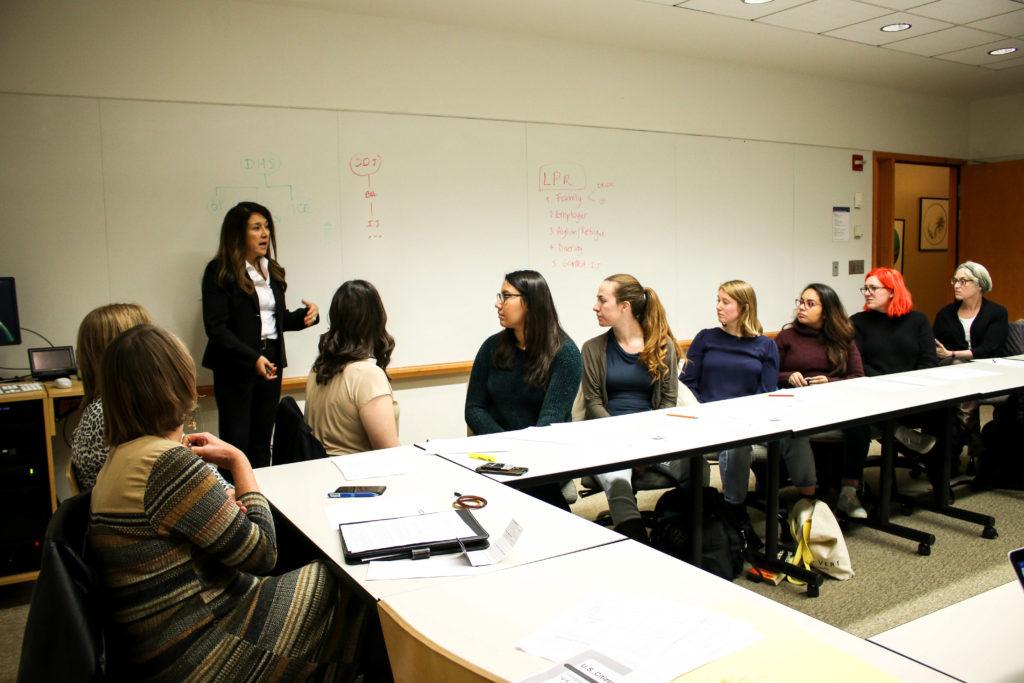On Monday, Nov. 6, Grinnell College hosted a panel called “Policy in Practice: Supporting Undocumented and DACAmented students.” The talk was the most recent development in Grinnell’s commitment to community members affected by the termination of DACA.
The talk, sponsored by the Office of International Student Affairs, American Studies and the Rosenfield Program, was initiated by students Sofia Martinez ’20 and Karla Gomez ’19. They aimed to inspire conversation on campus about DACA and the recent developments with US immigration policy.
“After a few meetings, we [said], ‘Okay, we think we know what we want to do. … More than anything, we want to inform people about what’s going on, what our community is feeling and how this impacts students,” Gomez said.
The panel informed students of the realities of living as a non-citizen in the United States. Visiting speaker Miryam Antúnez De Mayolo, an immigration attorney with Frerichs Law Office, spoke about the specifics of American immigration policy and what the technicalities of the deportation process mean for those at risk of being subjected to it.
“When you are not a citizen, you are only a guest in this country,” Antúnez De Mayolo explained.
As such, it is very easy for undocumented residents to find themselves swept up in the deportation process. As Antúnez De Mayolo noted, non-citizens who are unaware of their own rights are often taken advantage of by overzealous officials seeking out a lack of documentation. She also discussed the specifics of immigration court proceedings and the oft-convoluted nature of deportation, including the provisional waivers that prevent undocumented immigrants seeking permanent residency from returning to the United States upon exit.
“The immigration system that we have now doesn’t work for anyone. It’s completely broken,” Antúnez De Mayolo said.
However, there may be hope for improved immigration policy yet. Antúnez De Mayolo referenced Senate Bill 1615, also known as the Dream Act of 2017, which was introduced in July by Senators Graham, Durbin, Flake and Schumer. According to Antúnez De Mayolo, the bill would grant a path to permanent residency for a considerably larger population than was covered by DACA.
“I don’t have a crystal ball to see if the new Dream Act will pass. Hopefully it will — it has bipartisan support. I think that it has a good chance, but given the history of the old immigration bills that have been proposed, I think we have to be careful,” Antúnez De Mayolo said.
So what can be done in the meantime to support fellow students and residents of the United States who have been affected by the repeal of DACA and US immigration policy? According to Antúnez De Mayolo, a good first step is to call representatives and tell them to vote for legislation like Senate Bill 1615. Affected students are advised to meet with an immigration attorney and see what other avenues are available for them now that DACA has been repealed.
As for what can be done to foster a more aware, supportive community as a whole, Office of International Affairs Karen Edwards and another speaker at the panel emphasized the importance of continuing conversations.
“I think as liberal arts learners that we have a responsibility to our peers to engage in deeper dialogue about how culture impacts the way you walk through the world,” Edwards said.
Gomez put similar emphasis on dialogue as a tool for promoting awareness and building a stronger community.
“If people don’t know about DACA or immigrant families or policies, they can’t make an informed opinion, so I think a panel like this … was the first step,” Gomez said.

However, as was emphasized in the panel, it is important to remember that the issue is not limited to Grinnell College.
“This discussion has taken place at Grinnell, but this discussion isn’t about Grinnell,” Edwards said. “This discussion is about immigration policy in our country and how it impacts college and university students … and individuals in our nation, period.”
Resources are available for students who have been affected by the repeal of DACA on the Office of International Student Affairs GrinnellShare page.


































































